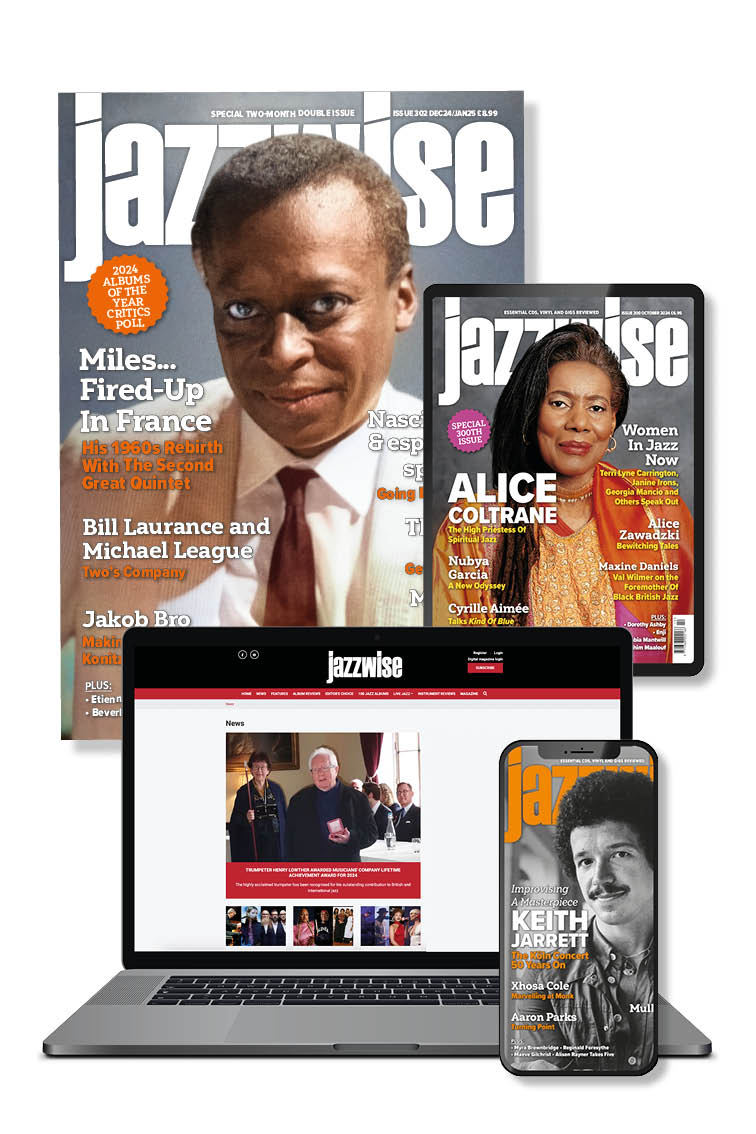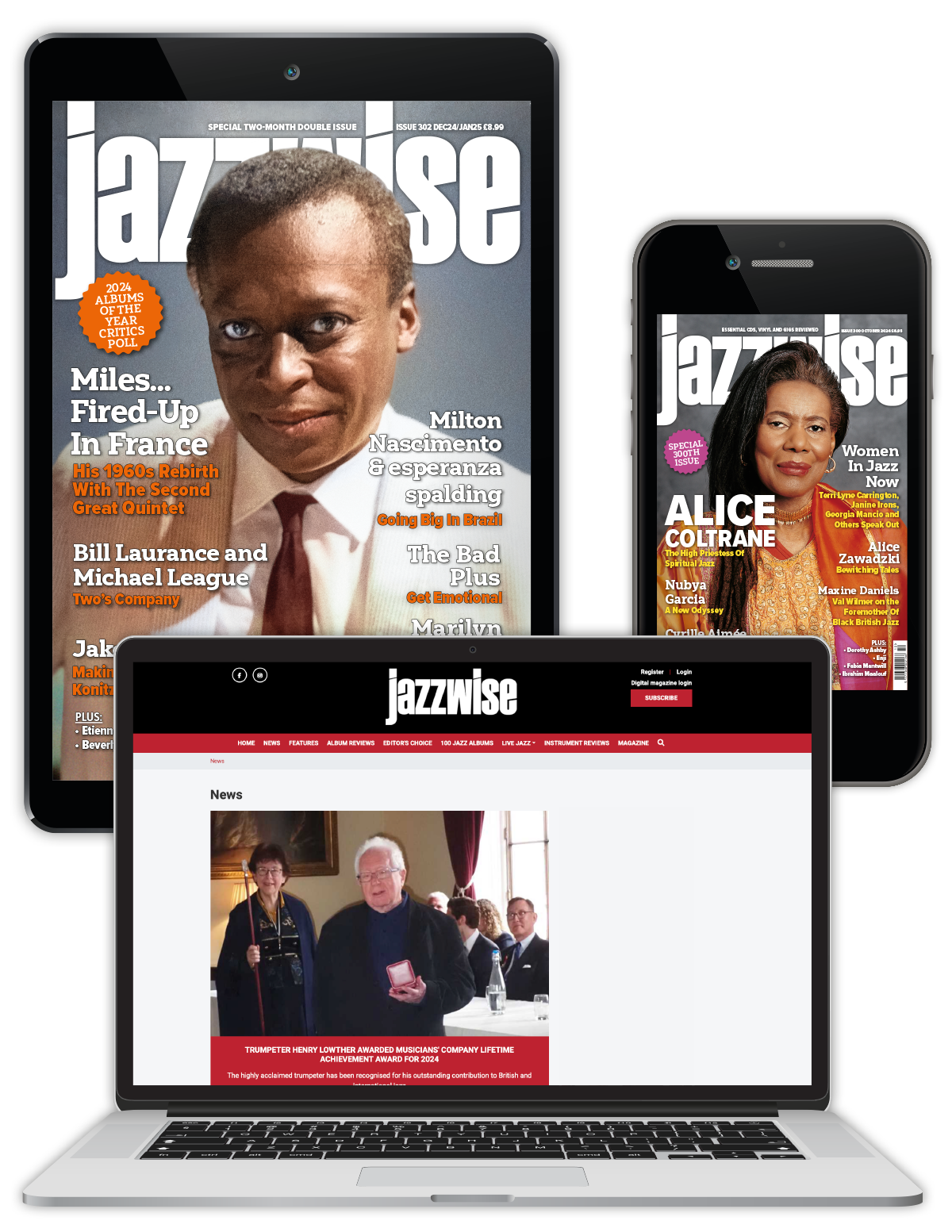Album Interview: Gilad Atzmon and the Orient House Ensemble: The Spirit of Trane
Author: Andy Robson
View record and artist detailsRecord and Artist Details
Musicians: |
Gilad Atzmon (ts, ss, cl, bcl, f) |
Label: |
Fanfare |
Magazine Review Date: |
November/2017 |
Catalogue Number: |
FJ1702 |
RecordDate: |
19-20 December 2016 |
Fifty years since his death, Coltrane's spirit lives on through the jazz works of many artists, not least Gilad Atzmon. Over time, Atzmon has developed a unique blend of Coltrane's tone melded with middle-eastern scales and glissandos. But The Spirit of Trane finds him following a different path. Instead, we discover Atzmon inhabiting the bluesier, more intimate side of Coltrane. The mood is set by a sublimely judged ‘In A Sentimental Mood’. The arrangement is close to the classic Ellington/Coltrane recording, but Atzmon, barring the melodic frame, makes no attempt to imitate his muse; he is lyrical, swinging, but in a lovely turn around, the extended outro reaches forward to Coltrane in Love Supreme mode. Stavi provides a glow-in-the-dark bass break and Harrison, as ever, with his sparse chords and Evans-ish feel is the perfect foil to Atzmon's riches. The emphasis on soul and ballad forms is iterated through a sensual ‘Soul Eyes’, which contrasts with a singing soprano on ‘Blue Train’. But it's the emphasis on the tenor, which Atzmon has eschewed much of late, that cheers the soul, notably on ‘Invitation’. Almost inevitably there's ‘Giant Steps’, and almost as inevitably Atzmon subverts it with a light lilting, soprano approach at almost tea-dance tempo. When he does attack using the later, coruscating Coltrane voice, the surprise is that it's on his own composition, ‘Minor Thing’. But it's those ballads, counterpointed and introduced by the tightly-disciplined string quartet, that catch the soul, most gorgeously on the desolate sweetness of ‘Naima’.
Jazzwise spoke to Gilad Atzmon about the album
You've already recorded your love affair with Bird: what is your relationship with Coltrane?
For me, Bird and Trane encapsulate that which made me fall in love with jazz in the first place. It's the spirit, the energy, the wit, the guts, the commitment to pushing the envelope. And yet, both aimed at beauty, at a truthful and genuine moment, which I sometimes miss in contemporary jazz.
You emphasise the more soulful Coltrane…
Correct. I've always been fascinated by Coltrane's approach to ballads, that linear melodic sense. However, evidently I couldn't resist some energetic outbursts, which jazz critiques often label ‘sheets of sound’.
You collaborated with Ros Stephens around Piazzolla and Bird, and she and the strings return here. What do they bring?
As far as I'm aware, Coltrane never recorded with strings… Ros is one of my favourite musicians. Her arrangements always feel like home to me. It's the raw transparency delivered in a huge warm sound.
Talking of sounds, how are you and the tenor getting on?
I was a tenor player the first 10 years of my career. I only became an altoist when I moved to London, mainly because of Ryanair and EasyJet. Unlike the alto that plays by itself and always cuts through, the tenor is unforgiving. It's demanding, it begs to be practiced. You constantly search for a mouthpiece and the right reed: by the time you're happy with your mouthpiece you become upset by your horn. Playing tenor means being constantly upset which is, as far as I am aware, a precious state of being.
Many artists, notably Denys Baptiste and Dave Liebman, have saluted Coltrane's legacy: what's the twist that makes OHE's reflections different?
For me Coltrane is spirit, it's beyond the notes, the chords, the sounds. It's a metaphysical sonic transition, a religious experience. We aim at that transparent moment of unity where beauty realises itself, by itself.
You've described Coltrane as a revolutionary: 50 years from his death how would he reflect on our world?
In the world in which we live, black lives do not matter at all, Palestinians are imprisoned behind walls, Syrians are dispossessed refugees, Bangladesh is under water. The revolution is not an event in time, it's an ongoing task. We are being institutionally betrayed by our politicians, media, academia and even by the cultural industry that reduces beauty to a commodity. The only people who are left to tell the truth are us, the deprived jazz artists. Why? Because we have nothing to lose (and probably nothing better to do).

Jazzwise Full Club
- Latest print and digital issues
- Digital archive since 1997
- Download tracks from bonus compilation albums throughout the year
- Reviews Database access
From £9.08 / month
Subscribe
Jazzwise Digital Club
- Latest digital issues
- Digital archive since 1997
- Download tracks from bonus compilation albums during the year
- Reviews Database access

